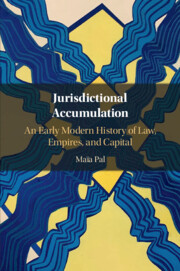Book contents
- Jurisdictional Accumulation
- Jurisdictional Accumulation
- Copyright page
- Dedication
- Epigraph
- Contents
- Acknowledgements
- Introduction
- 1 Early Modern Extraterritoriality
- 2 Historical Sociology, Marxism, and Law
- 3 Social Property Relations
- 4 Ambassadors
- 5 Consuls
- 6 Colonial Practices of Jurisdictional Accumulation
- 7 Analytical Crossroads
- Epilogue
- Bibliography
- Index
5 - Consuls
Published online by Cambridge University Press: 15 October 2020
- Jurisdictional Accumulation
- Jurisdictional Accumulation
- Copyright page
- Dedication
- Epigraph
- Contents
- Acknowledgements
- Introduction
- 1 Early Modern Extraterritoriality
- 2 Historical Sociology, Marxism, and Law
- 3 Social Property Relations
- 4 Ambassadors
- 5 Consuls
- 6 Colonial Practices of Jurisdictional Accumulation
- 7 Analytical Crossroads
- Epilogue
- Bibliography
- Index
Summary
Chapter 5 concerns the practices of Dutch, French, and English consuls in the Mediterranean and illustrates jurisdictional collaboration and conflict between sovereigns, merchants, trading companies, and regional institutions. It discusses the range of consuls' jurisdictional functions, the policies and strategies developed, such as the restrictive regulations increasingly put in place for the French service and its unique model of salaried and commissioned consuls, as well as the different practices found in Christian and non-Christian parts of the Mediterranean. Through a selection of archive material regarding events in the French embassy in Constantinople from the 1660s to 1680s, the analysis reveals a more interdependent relation between ambassadors and consuls in shaping extraterritorial and jurisdictional spaces. Focusing on class differences and social origins emphasises the role of consular diplomacy, its connection to the aristocratisation of ambassadorial diplomacy, and the development of different forms of early modern mercantilism. French consular practices are better categorised as transplants of authority, in contrast to the less jurisdictionally autonomous role of English and Dutch consular attempts to transport their sovereign’s authority.
Keywords
- Type
- Chapter
- Information
- Jurisdictional AccumulationAn Early Modern History of Law, Empires, and Capital, pp. 194 - 236Publisher: Cambridge University PressPrint publication year: 2020



